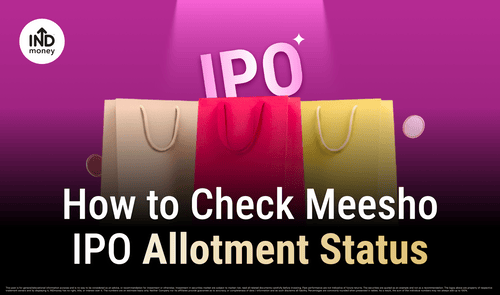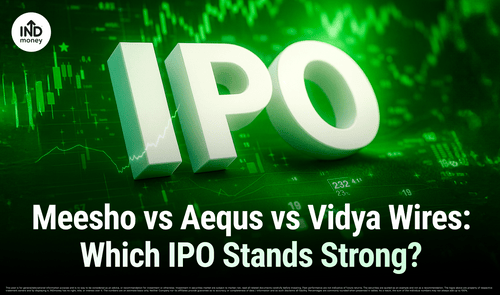
Meesho IPO
Meesho IPO Price Range is ₹105 - ₹111, with a minimum investment of ₹14,985 for 135 shares per lot.
Subscription Rate
79.02x
as on 05 Dec 2025, 05:56PM IST
Minimum Investment
₹14,985
/ 135 shares
IPO Status
Price Band
₹105 - ₹111
Bidding Dates
Dec 3, 2025 - Dec 5, 2025
Issue Size
₹5,421.20 Cr
Lot Size
135 shares
Min Investment
₹14,985
Listing Exchange
BSE
IPO Doc
Meesho IPO Application Timeline




IPO Subscription Status
as on 05 Dec 2025, 05:56PM IST
IPO subscribed over
🚀 79.02x
This IPO has been subscribed by 19.038x in the retail category and 120.182x in the QIB category.
Subscription Rate
| Total Subscription | 79.02x |
| Retail Individual Investors | 19.038x |
| Qualified Institutional Buyers | 120.182x |
| Non Institutional Investors | 38.146x |
Objectives of IPO
- The total IPO size aggregates to ₹5,421.2 crore. This offer consists of two parts: a Fresh Issue aggregating up to ₹4,250 crore (78% of the total IPO size) and an Offer for Sale (OFS) of up to 10.5 crore Equity Shares aggregating to ₹1,171.2 crore. The funds from the Offer for Sale portion go entirely to the selling shareholders, which include the promoters, such as Vidit Aatrey and Sanjeev Kumar, and corporate investors like Elevation Capital, Peak XV Partners, Venture Highway, Gemini Investments, and others. The money received from the fresh issue will be used for four key purposes.
- The company intends to utilize ₹1,390 crore for Investment in cloud infrastructure in its subsidiary, Meesho Technologies Private Limited (MTPL). This is necessary because MTPL operates the company’s core e-commerce marketplace, and cloud infrastructure is essential to support platform growth, enhance its AI capabilities, and maintain a secure and flexible network.
- An amount of ₹ 480 crore is allocated for the payment of salaries for the Machine Learning and AI and technology teams for AI and technology development. This investment targets talent retention and hiring specialized professionals, focusing on developing content creator technologies and optimizing operations at scale. The total combined salary expenditure for these teams was ₹293.86 crore in FY25.
- The company proposes to utilize ₹1,020 crore for expenditure towards marketing and brand initiatives. Marketing efforts are critical, evidenced by the growth in Annual Transacting Users (ATUs) from 13.64 crore in FY23 to 19.88 crore in FY25 and 23.42 crore in H1 FY26. It plans to deploy ₹480 crore in FY27 and ₹540 crore in FY28 for brand campaigns, performance marketing, and other initiatives.
- The remaining funds from the fresh issue will be utilized in funding inorganic growth through acquisitions and other strategic initiatives, and general corporate purposes. Strategic initiatives include investing in Meesho AI Labs (for AI applications across various functions) and developing a low-cost local logistics network for daily essentials.
Financial Performance of Meesho
The company demonstrates rapid growth in scale alongside fluctuating profitability and significant improvements in cash generation. Its revenue showed strong growth, increasing at a 29.6% Compound Annual Growth Rate (CAGR) from FY23's ₹5,898 crore to FY25's ₹9,901 crore. This momentum continued into the first half of FY26 (H1 FY26), rising 28.89% year-over-year (YoY) from ₹4,545 crore in H1 FY25 to ₹5,858 crore. This growth is directly linked to an increase in Annual Transacting Users (ATU), which scaled from 13.64 crore in FY23 to 23.42 crore by the last twelve months (LTM) ending September 30, 2025.
Despite robust top-line growth, the company incurred substantial losses. The loss jumped from ₹327.64 crore in FY24 to a massive ₹3,941.71 crore in FY25. This extreme rise in FY25 was mainly due to significant one-time exceptional costs related to the corporate reorganisation of the company. However, the loss sharply reduced by 72.12% in H1 FY26 to ₹700.72 crore compared to the prior H1 period.
Critically, the core business economics show improvement, though recently challenged. The Contribution Margin (Marketplace) improved dramatically from 2.94% in FY23 to a peak of 5.81% in H1 FY25. This improvement was due to rising marketplace revenue and better cost control driven by the launch and scaling of its proprietary logistics platform, Valmo, and increased prepaid orders. However, the margin decreased to 3.82% in H1 FY26, a result of its strategy to reduce the Average cost charged to sellers by passing on cost efficiencies.
The shift in efficiency is most evident in cash generation. Last Twelve Months' Free Cash Flow (LTM FCF) improved from a deficit of ₹2,336.4 crore in FY23 to a positive ₹591.24 crore by FY25. The LTM FCF as a percentage of NMV also increased from a negative 12.15% to 1.97% over the same period, validating its capital-efficient platform model.
Strengths and Risks
Strengths
It is India's largest platform by the number of Annual Transacting Users (customers) in the last twelve months ended September 30, 2025, reaching 23.42 crore. This scale drives momentum, as evidenced by placed orders growing from 102 crore in FY23 to 183 crore in FY25.
It has transitioned to substantial positive cash generation, reporting the largest Free Cash Flow among scaled listed Indian e-commerce companies in the last twelve months ended September 30, 2025. LTM Free Cash Flow improved dramatically from a negative ₹2,336.37 crore in FY23 to ₹581.5 crore in H1 FY26.
The business model is highly asset-light, avoiding ownership of inventory, manufacturing, or captive logistics, unlike many competitors. This approach results in high capital efficiency, achieving the highest value of goods sold (GMV) per full-time employee (FTE) among peer groups, reaching ₹29.39 crore in the last twelve months ended September 30, 2025.
The Contribution Margin (Marketplace) improved significantly, increasing from ₹565.86 crore in FY23 to ₹1,483.65 crore in FY25. This shows strong growth in the core marketplace profitability, with Contribution Margin as a percentage of Net Merchandise Value (NMV) rising from 2.94% to 4.95% during this period.
The efficiency gains are passed to sellers, lowering the average cost charged to them per placed order from ₹55.97 in FY23 to ₹44.20 in the six months ended September 30, 2025. This cost reduction, enabled by scale and zero commissions, allows sellers to offer competitive prices, attracting more than 7.06 lakh Annual Transacting Sellers (57% higher than 4.5 lakh in FY23).
It maintains a technology-first approach, employing 1,182 full-time technology employees as of September 30, 2025, representing 56.77% of its total employee base of 2,082. Its AI/ML models are highly scaled, processing over 592 crore data points daily in the six months ended September 30, 2025, to refine fulfillment and personalization.
The proprietary logistics platform, Valmo, provides a demonstrable cost advantage. Valmo’s average cost per shipment for a surface-delivered shipment weighing 0.5-1 kg is 0.5-11% lower than the average cost of scaled e-commerce logistics providers in India. Valmo handled 69.54 crore Shipped Orders (64.52% of total Shipped Orders) in the six months ended September 30, 2025.
The business exhibits a strong negative working capital cycle. Its net working capital days improved from negative 18 days in FY23 to negative 26 days in the six months ended September 30, 2025. This allows it to hold on to funds longer, supporting operations and strong cash flow generation. The negative 26 days means the business holds funds for 26 extra days, supporting its cash flow.
Risks
The company has incurred losses since its inception in 2015. Although losses have decreased, it still reported a loss before exceptional items and tax of ₹433.21 crore in the six months ended September 30, 2025. It also experienced negative cash flows from operating activities of ₹850.64 crore in the same period.
A substantial portion of its Annual Transacting Sellers are concentrated in just three states. For the last twelve months ended September 30, 2025, sellers from Uttar Pradesh (15.87%), Gujarat (15.70%), and Delhi (13.78%) constituted 45.35% of the total seller base, exposing it to localized regulatory, political, or natural disaster risks.
The business relies heavily on cash transactions, exposing it to operational inefficiencies and risks related to cash handling by fragmented logistics partners. In the six months ended September 30, 2025, 72% of all Shipped Orders utilized CoD as the payment method.
Product return rates pose a constant risk to consumer trust and seller engagement. Return orders constituted 7.85% of Shipped Orders in the six months ended September 30, 2025, suggesting potential challenges in maintaining perceived product quality and delivery consistency among its fragmented seller base.
It faces substantial contingent liabilities primarily related to ongoing disputes and litigation. As of September 30, 2025, outstanding claims against the group not acknowledged as debts totaled ₹593.56 crore, including ₹572.07 crore relating to an Income Tax dispute alone.
Statutory auditors noted material modifications related to internal controls, including incomplete daily backups of electronic records on India-based servers for FY23-FY25. Furthermore, the accounting software used lacked enabled audit trail features in FY24 and FY25, exposing it to potential risks regarding data integrity and governance.
New business segments, focused on high-growth areas like financial services and local logistics, are currently loss-making. For the six months ended September 30, 2025, the new initiatives segment reported an adjusted EBITDA loss of ₹30.11 crore, which could require continued financial support, negatively impacting consolidated cash flows.
How to Apply for Meesho IPO on INDmoney
- Download the INDmoney app and complete your KYC.
- Go to INDstocks → IPO, or just search “IPO”.
- Tap on Meesho IPO from the list of live IPOs.
- View key details like price band, lot size, and dates.
- Tap Apply Now and choose your number of lots.
- Use INDpay UPI for instant mandate tracking.
- Your funds will be blocked until the share allotment is finalized.
Listed Competitors of Meesho
Company | Operating Revenue (₹ Cr) | Adjusted EBITDA | Profit (₹ Cr) | Market Cap to Sales Ratio | RoNW | Annual Transacting Users |
Meesho | ₹9,390 Cr | -₹220 Cr | -₹3,941.7 Cr | 5.34 | -252.37% | 19.88 Cr |
₹7,660 Cr | ₹394 Cr | -₹265 Cr | 2.19 | -26.63% | 1.06 Cr | |
₹7,950 Cr | - | ₹72 Cr | 9.67 | 5.21% | 1.9 Cr |
Meesho Shareholding Pattern
| Promoters | 18.5% | |
| Name | Role | Stakeholding |
| Vidit Aatrey | Promoter | 11.09% |
| Sanjeev Kumar | Promoter | 7.41% |
| Public | 81.5% | |
| Name | Role | Stakeholding |
| Elevation Capital V Limited | Public | 13.6% |
| Naspers Ventures B.V. | Public | 12.34% |
| Peak XV Partners Investments V | Public | 11.3% |
| SVF II Meerkat (DE) LLC | Public | 9.3% |
| WestBridge Crossover Fund, LLC | Public | 3.92% |
| Astrend India Investment Limited | Public | 2.28% |
| Peak XV Partners Growth Investments IV | Public | 1.51% |
| RPS WOS II, LLC | Public | 1.27% |
| Y Combinator Continuity Holdings I, LLC | Public | 1.22% |
| Fid FDI 312, LLC | Public | 1.21% |
| Mars Equity Dragon Fund VCC | Public | 1.21% |
| Gemini Investments, L.P. | Public | 1.04% |
| Fidelity Growth Company Commingled Pool | Public | 1.02% |
| Spruce SEC Ltd. | Public | 1.01% |
| Others | 19.27% |
About Meesho
Its target customers are mass-market consumers from diverse income backgrounds across India, especially those seeking affordable, low-cost products. The main markets emphasize broad penetration across India, especially targeting non-metros such as Tier 2+ cities (cities with populations less than one million). The scale is substantial, reaching 23.42 crore customers and 7.06 lakh Annual Transacting Sellers in the last twelve months ended September 30, 2025. The platform recorded 126.1 crore Placed Orders in the six months ended September 30, 2025. Its proprietary logistics platform, Valmo, managed 69.5 crore Shipped Orders in the same period.
The business is structured around self-reinforcing cycles, known as flywheels. It begins when consumers are drawn by low prices and wide product choice. This results in high volume, attracting more sellers and logistics partners, intensifying competition and efficiency. Content creators boost product discovery, increasing sales and reinforcing the cycle. All these interactions produce data that feeds back into its AI/ML models for continuous refinement. It plans to increase consumer transaction frequency by further expanding product listings and the seller base. The company’s future focus includes testing Horizon 2 Initiatives (new opportunities) like AI-led innovation and scaling a low-cost local logistics network for daily essentials, as per RHP.
For more details, visit here: www.meesho.com
Know more about Meesho
Meesho Share Lists at 46% Premium: What Investors Should Do Now?
Meesho IPO listed at a 46.4% premium with a ₹73,338 crore market cap. See valuations, risks, lock-in dates, and what different investors can track next.

Meesho IPO Allotment Status: Check on KFinTech, NSE & BSE
Want to know if you got Meesho IPO shares? Learn step‑by‑step how to check your allotment status on BSE, NSE, and Kfintech, what the result means, plus a simple view of Meesho’s GMP and subscription trend before listing.

Meesho vs Aequs vs Vidya Wires: Which IPO Stands Strong?
Compare the Meesho, Aequs, and Vidya Wires IPOs in one simple guide. See GMP trends, valuations, risks, business strengths, and long-term potential to decide which IPO fits your investment approach.

Frequently Asked Questions of Meesho IPO
What is the size of the Meesho IPO?
What is the allotment date of the Meesho IPO?
What are the open and close dates of the Meesho IPO?
What is the lot size of Meesho IPO?
When will my Meesho IPO order be placed?
Can we invest in Meesho IPO?
What would be the listing gains on the Meesho IPO?
What is 'pre-apply' for Meesho IPO?
Who are the promoters of Meesho?
Meesho’s promoters are Vidit Aatrey and Sanjeev Kumar. They collectively hold 18.5% of the pre-IPO equity share capital. Both are also participating as Selling Shareholders in the Offer for Sale.
Who are the competitors of Meesho?
Meesho’s competitors include scaled e-commerce players and listed multi-category retail companies in India. Listed peers used in the RHP for financial comparison include Swiggy, Brainbees Solutions (FirstCry), FSN E-Commerce (Nykaa), Eternal, Vishal Mega Mart, Trent, and Avenue Supermarts.
How does Meesho make money?
Meesho monetizes its multi-sided platform by charging sellers for services like order fulfilment, advertising, and data insights. It operates on a zero-commission model for sellers. Its Marketplace segment generated ₹5,573.91 crore in revenue in the six months ended September 30, 2025, which was 99.93% of its total operating revenue.